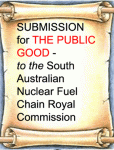Nuclear Royal Commission downplays the safety and environmental risks of importing nuclear wastes – Gil Anaf
“….42. Yet there can be no guarantee that accidents will not occur again. While the consequences are severe,…. It seems remarkable to me that, while it is acknowledged that accidents cannot be prevented, there is at the same time a disavowal of the extremity of the consequences of any accident involving this nuclear storage facility. The very nature of the risk, of extreme long term contamination of food and water supplies, and of aquifers, seems oddly denied, which is concerning.
63. The safe management, storage and disposal of Australian and international waste require both social consent for the activity and advanced technical engineering to contain and isolate the waste. Of the two, social consent warrants in planning and development much greater attention than the technical issues. As stated above, this point seemingly downplays the risks inherent in the venture, making the technology sound more persuasive than in reality it can be deemed to be.
77. Engineered barriers are designed to work in combination to greatly delay the exposure of the fuel to groundwater and ensure that if the radionuclides migrate into the natural environment, the level of radioactivity would be below that produced by natural sources. Again and with respect, this is an astonishing assertion. This seems to exaggerate the expertise required to establish the facility to such an extent that even reference to “exposure” does not raise the very obviousissue of risk: ie, what on earth are we doing even considering any possible leakage? Are we really so expert that we can foresee and manage any leakage, with its attendant extreme risk?…..
90. Further, because the society would carry the risks of the activity in the long term, it is entitled to the significant benefits. This does not mean the government would be precluded from sourcing appropriate private sector operational expertise. In my view, the acknowledgement of “carrying risks” is not easily reconciled with the potential extremity of the risk involved. It therefore is highly questionable whether society should carry this risk, since it potentially also affects future generations who may well be burdened by decisions we make in the present.
That private expertise may be sourced too, seemingly ignores the probable (in my opinion) conflicts of interest that will necessarily arise when private profit agendas are pitted against the wider interests of original and subsequent land owners, and the rights of the citizenry.
In conclusion, having read the Tentative Findings of the Nuclear Fuel Cycle Royal Commission, I feel obligated to say that the style in which these findings are presented seem to me to seriously down-play, and minimise, the quite significant and potentially catastrophic scenarios the community is being asked to accept.
This defies common sense; the risks and burdens to current and future generations are much more significant than our short-term economic troubles. In regard to the latter, it is unclear how sustainable the economic benefits are, compared with maintenance costs. http://nuclearrc.sa.gov.au/app/uploads/2016/04/Anaf-Gil.pdf
No comments yet.




Leave a comment